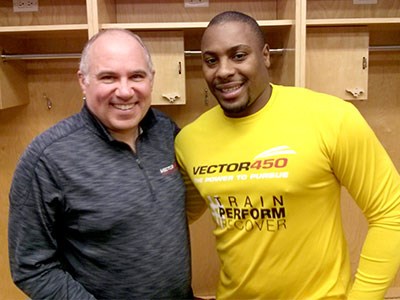Thunder Bay biotechnology company with an innovative sports performance supplement is gearing up for a wave of expansion and new consumer products in the next year that could have wide-reaching health-care applications.
IGY Life Sciences and Technology specializes in the extraction, development and commercialization of antibodies, or immunoglobulin (IgY), taken from chicken egg yolk. The 15-employee company has eyes on marketing these antibodies with a full range of over-the-counter supplements.
The company has been working the nutraceutical side of the street since 2009, but the privately-held firm with about 50 investors is preparing to make a bold move into the pharmaceutical industry.
The company has perfected a proprietary process at a facility in Airdrie, Alta. that extracts purified immunoglobulin from chicken egg yolks. IgY is a natural antibody to boost the human immune system.
Hen eggs contain as many as 2,000 antibodies and when applied to targeted illnesses can attack fungal, bacterial or viral infections or various pathogens that enter the body through the stomach.
“We come at it a different way,” said Terry Dyck, president and CEO of IGY Life Sciences. “We don’t vaccinate the humans, we vaccinate the chickens.”
Last September the company obtained Health Canada approval to launch Vector 450, a sports nutrition supplement geared to elite-level athletes to improve their competitive endurance, training recovery time, inflammation of joints, and to aid in healing injuries.
“Athletes are kind of a cool group,” said Dyck. “They’re tough and strong, but if you want to be a high-end pro athlete, you end up beating the heck of your immune system. They work out so much, they end up going from healthy to unhealthy. They’re our biggest volunteers.”
The company has collected testimonials from Olympic-caliber and professional athletes like the Canadian Football League’s Nik Lewis, a 10-year veteran wide receiver with the Calgary Stampeders, and Miami Heat superstar Lebron James.
Dyck claims James has used the product for two years and it’s been a difference-maker toward improving his late-season stamina and mental focus.
“Lebron has won two titles and a gold medal as a result of using that product.”
Dyck said the supplement has been cleared through the NSF Certified for Sport lab, which tests for banned substances to meet the World Anti-Doping Standards.
Despite a slew of feel-good stories, the company intends to scientifically build up the clinical evidence through ongoing research partnerships with the University of North Texas, McMaster University and the International Vaccine Institute.
Early test results indicate is that the company’s extract – branded as Muno-IgY – boosts the body’s ability to produce interferon gamma, a critical protein for healing wounds and produce white blood cells to fight viral and bacterial infection.
“It’s starting to explain why this recovery story is happening,” said Dyck.
Through ongoing testing, the company intends to roll out a suite of products in the coming years to target a wider demographic – including seniors – as a preventative supplement that could save the health-care industry billions.
“If we can keep an athlete healthy, we can keep an 80-year-old healthy,” said Dyck.
Dyck said they can vaccinate their hens to specifically target influenza, Lupus, E. Coli, C. difficile, SARS and a multitude of other ailments.
They’ve been approached by a German company to partner on a possible cancer treatment and have presented in Washington to showcase the product’s use as a possible bio-terrorism countermeasure.
“We got science partners scattered around the world and they’re coming to us,” said Dyck, who joined the company in 2009 with no scientific research background but plenty of Bay Street connections from his 15 years as a stockbroker. That experience helped net a $25-million private equity deal with Legacy Partners Wealth Strategies of Toronto last year.
Dyck expects the company to be making news in the coming year with “big projects” on influenza while continuing to focus on their clinical work with athletes.
But to prepare for expansion, the company must decide whether to stay in Thunder Bay.
Dyck would like to build a pharmaceutical manufacturing plant, but the company has to weigh the pros and cons of setting up shop in northwestern Ontario. The region offers an abundance of water, but the price of power could work against it.
“Can we stay in Thunder Bay? We haven’t figured that out yet.
“We’re going to try to make the argument that we should stay here but people are trying to pull us elsewhere.”
He’s fielded offers to relocate to Texas, Winnipeg (close to Canada’s only level-4 containment lab) and Belleville, with the lure of recently retrofitted vaccine laboratory.
The company also needs to build and house its own egg-laying facility to test vaccines at the clinical trial stage. A location decision will be made in the next 12 to 24 months.




